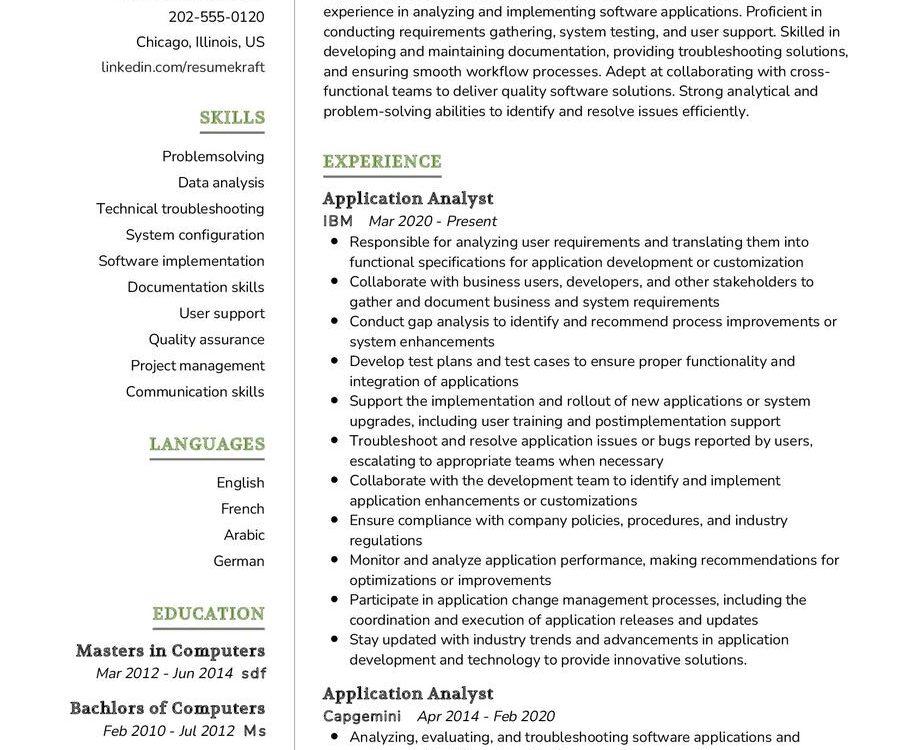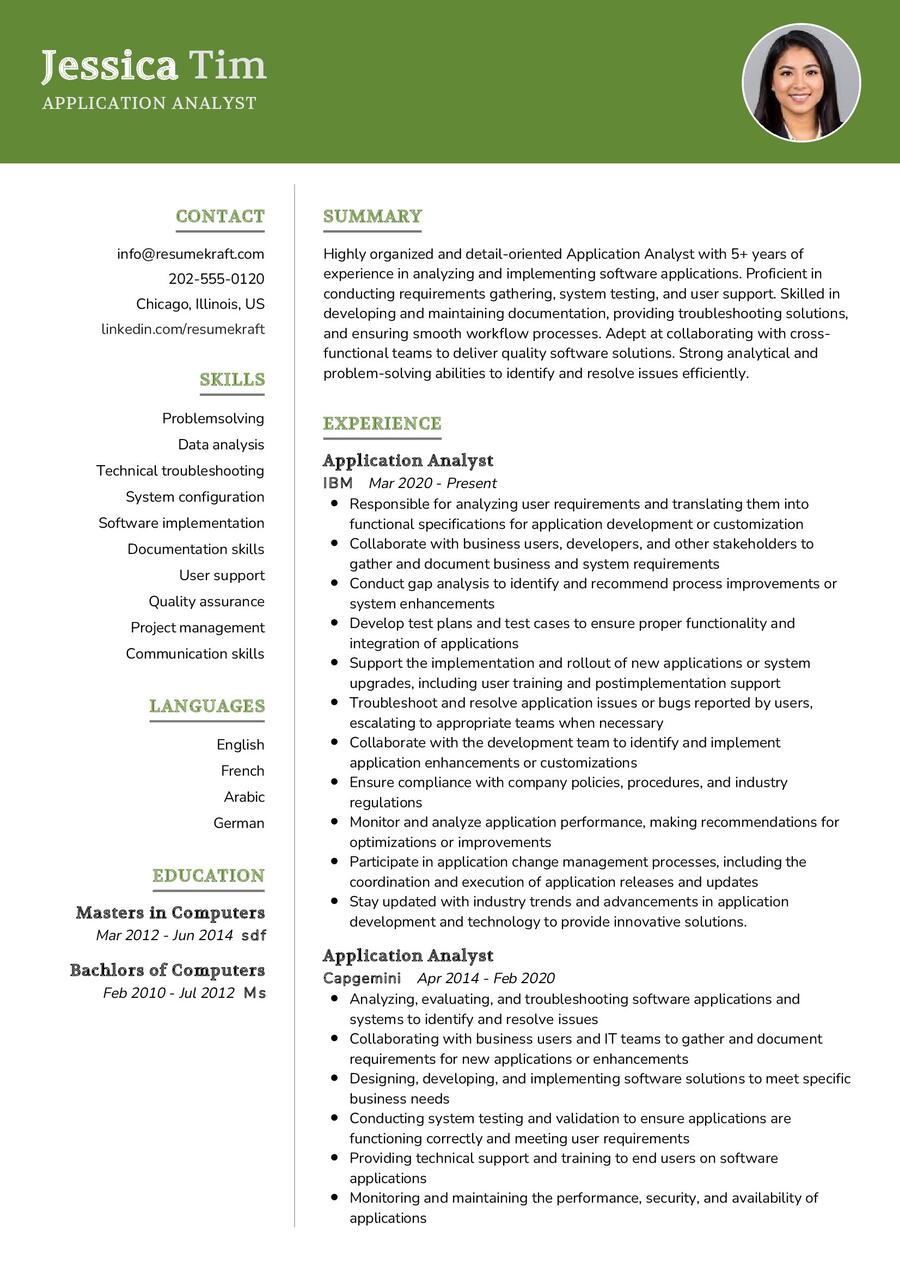Understanding the Role of an Application Analyst
As organizations embrace digital transformation, the role of an Application Analyst has become integral to ensuring seamless software functionality and efficient business processes. This position requires a unique blend of technical expertise and analytical skills. In this article, we’ll delve into the multifaceted responsibilities of an Application Analyst, the essential job requirements, and how to craft a compelling resume that highlights your qualifications.
Key Responsibilities of an Application Analyst
The role of an Application Analyst is dynamic and involves a range of responsibilities to optimize and support software applications. Let’s explore the core tasks that define this position:
- **Software Analysis and Evaluation:** Conduct in-depth analysis of existing software applications, assessing their performance, identifying areas for improvement, and evaluating potential upgrades or replacements.
- **Issue Resolution:** Troubleshoot and resolve software-related issues, collaborating with development teams to implement effective solutions.
- **User Support:** Provide support to end-users, offering guidance on software functionality, addressing queries, and ensuring a positive user experience.
- **Requirements Gathering:** Work closely with stakeholders to gather and document software requirements, ensuring that applications align with organizational needs.
- **Testing and Quality Assurance:** Develop and execute comprehensive testing plans to ensure software quality, identifying and addressing any bugs or inconsistencies.
- **Implementation of Upgrades:** Coordinate and oversee the implementation of software upgrades, ensuring a smooth transition and minimal disruption to business operations.
- **Documentation:** Maintain detailed documentation of software configurations, changes, and user guides for future reference and training purposes.
Each responsibility is a vital thread in the tapestry of an Application Analyst’s daily tasks, contributing to the overall efficiency of software applications within an organization.
Job Requirements for Aspiring Application Analysts
To embark on a successful journey as an Application Analyst, individuals must meet specific educational and skill-related prerequisites. Let’s outline the key requirements for this role:
- **Educational Background:** Possess a Bachelor’s or Master’s degree in Computer Science, Information Technology, or a related field, demonstrating a solid foundation in the technical domain.
- **Technical Proficiency:** Exhibit a deep understanding of software development processes, including experience with programming languages and familiarity with various operating systems.
- **Analytical Skills:** Showcase strong analytical and problem-solving skills, with the ability to assess complex software issues and formulate effective solutions.
- **Communication Skills:** Demonstrate excellent communication skills, both written and verbal, to effectively interact with stakeholders, end-users, and development teams.
- **Detail-Oriented:** Possess a meticulous approach, ensuring attention to detail in software analysis, testing, and documentation.
- **Adaptability:** Display adaptability in the face of evolving software landscapes, staying updated on industry trends and emerging technologies.
- **Team Collaboration:** Work collaboratively with cross-functional teams, fostering a cooperative environment for effective software development and support.
Obtaining relevant certifications, such as those in software analysis or project management, can enhance your profile in the competitive job market.
Crafting a Standout Application Analyst Resume
Your resume is a powerful tool to showcase your qualifications and stand out in the competitive job market. Consider the following tips when crafting your Application Analyst resume:
- **Highlight Analytical Achievements:** Showcase instances where your analytical skills led to successful issue resolution or software improvements.
- **Detail Software Enhancements:** Provide specifics on software upgrades or optimizations you have implemented, quantifying their impact on efficiency.
- **Quantify Your Contributions:** Use metrics to quantify your achievements, emphasizing the positive outcomes of your work.
- **Include Relevant Skills:** List technical skills, such as proficiency in programming languages, software testing tools, and any specific applications you have expertise in.
- **Customize for the Role:** Tailor your resume for the specific Application Analyst position, aligning your skills and experiences with the job description.
Your resume is your personal marketing document, telling the story of your skills and accomplishments as an Application Analyst.
Application Analyst Resume Summary Examples
Your resume summary serves as the opening statement of your professional journey. Craft a compelling summary that encapsulates your experiences and value. Here are examples to inspire you:
- “Results-driven Application Analyst with a proven track record in optimizing software functionality and resolving complex issues. Adept at collaborating with cross-functional teams to deliver efficient solutions.”
- “Experienced Application Analyst skilled in software analysis, testing, and user support. Demonstrated success in implementing upgrades and ensuring seamless software performance.”
- “Detail-oriented Application Analyst with strong analytical and communication skills. Recognized for enhancing software efficiency through strategic upgrades and user-focused support.”
Your resume summary is the first impression you make on potential employers, so make it impactful and reflective of your capabilities.
Building a Robust Experience Section for Your Application Analyst Resume
The experience section is the core of your resume, providing a detailed narrative of your professional journey. Consider the following examples to guide you in crafting this section:
- “Led software analysis initiatives, identifying and resolving critical issues that resulted in a 15% improvement in overall application efficiency.”
- “Coordinated the successful implementation of software upgrades, ensuring minimal downtime and achieving a 20% increase in user satisfaction.”
- “Provided user support, addressing queries and conducting training sessions that contributed to a 25% reduction in software-related support tickets.”
Your experience section should showcase your impact, illustrating how your contributions have positively influenced software functionality and user experience.
Education Section for Your Application Analyst Resume
Your educational background is a foundation for your career. List your academic achievements in a way that highlights your commitment to learning and expertise in the field:
- Bachelor of Science in Computer Science, XYZ University, providing a solid foundation in programming and software development, 2016.
- Master of Science in Information Technology, ABC University, specializing in software analysis and project management, 2018.
- Certification in Software Analysis and Testing, demonstrating ongoing commitment to staying updated on industry best practices, 2019.
Your educational journey showcases your dedication to acquiring knowledge and expertise in the field of software analysis.
Key Skills for Your Application Analyst Resume
Your skill set is your toolkit, showcasing the abilities that make you an effective Application Analyst. Here are the key skills you should include:
Soft Skills:
- Analytical and problem-solving skills for effective issue resolution.
- Excellent communication skills to interact with diverse stakeholders.
- Detail-oriented approach for thorough software analysis and documentation.
- Adaptability to stay abreast of evolving software landscapes and emerging technologies.
- Team collaboration for effective cross-functional cooperation.
Hard Skills:
- Proficiency in programming languages relevant to your role.
- Experience with software testing tools to ensure high-quality applications.
- Familiarity with various operating systems for comprehensive software analysis.
- Knowledge of project management principles to coordinate software upgrades.
- Understanding of database systems and their integration with applications.
Each skill in your toolkit contributes to your effectiveness as an Application Analyst, ensuring optimal software performance.
Common Mistakes to Avoid in Your Application Analyst Resume
When crafting your resume, be mindful of common pitfalls that can hinder your chances of securing your desired role. Here are mistakes to avoid:
- **Generic Approach:** Avoid using a one-size-fits-all resume. Customize your application for each specific position to highlight your unique fit for the role.
- **Lack of Achievements:** Instead of listing duties, emphasize your achievements and the impact of your contributions to software efficiency.
- **Neglecting the Cover Letter:** Don’t overlook the importance of a cover letter. Use it as an opportunity to tell your story and connect with potential employers.
- **Technical Jargon Overload:** While showcasing technical skills is crucial, ensure that your resume is accessible to non-technical readers by avoiding excessive jargon.
- **Failure to Proofread:** A simple but critical step. Proofread your resume to maintain a professional image and avoid errors.
Avoiding these mistakes will help you present a resume that is both authentic and compelling, increasing your chances of standing out to employers.
Takeaways for Your Application Analyst Resume
As you conclude the process of crafting your Application Analyst resume, remember these key takeaways:
- **Showcase Analytical Achievements:** Emphasize instances where your analytical skills led to successful software improvements or issue resolutions.
- **Highlight Technical Proficiency:** Clearly outline your technical skills, including programming languages, testing tools, and relevant applications.
- **Quantify Contributions:** Use metrics to quantify the impact of your achievements, providing a tangible representation of your successes.
- **Continuous Learning:** Include a section on your commitment to continuous learning, showcasing certifications and courses undertaken to stay updated on industry best practices.
Your resume is not just a document; it is a canvas where you paint your career story, illustrating growth, learning, and expertise as an Application Analyst. Best of luck!
Finally, feel free to utilize resources like AI Resume Builder, Resume Design, Resume Samples, Resume Examples, Resume Skills, Resume Help, Resume Synonyms, and Job Responsibilities to create a standout application and prepare for the Application Analyst job interview.


